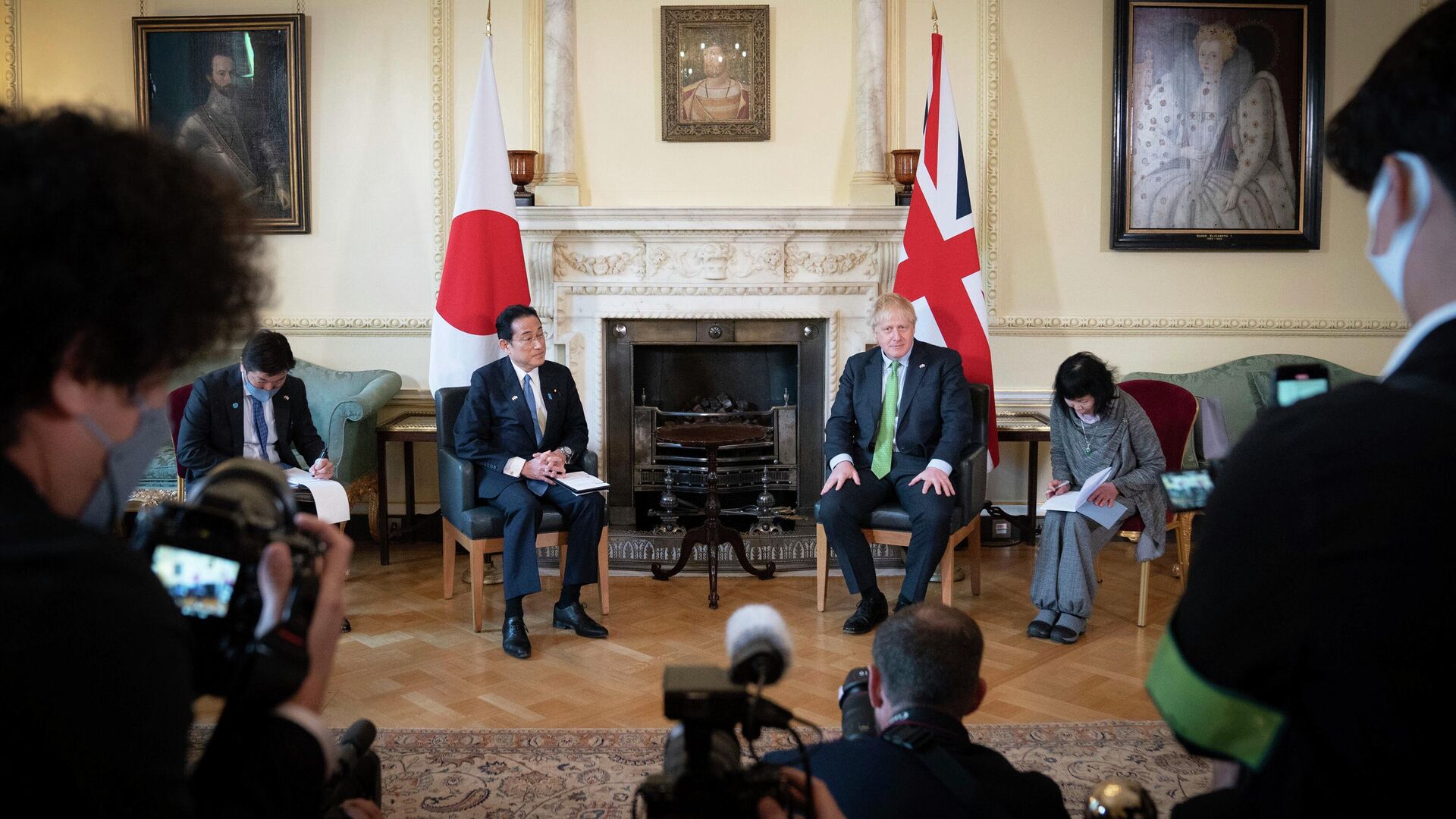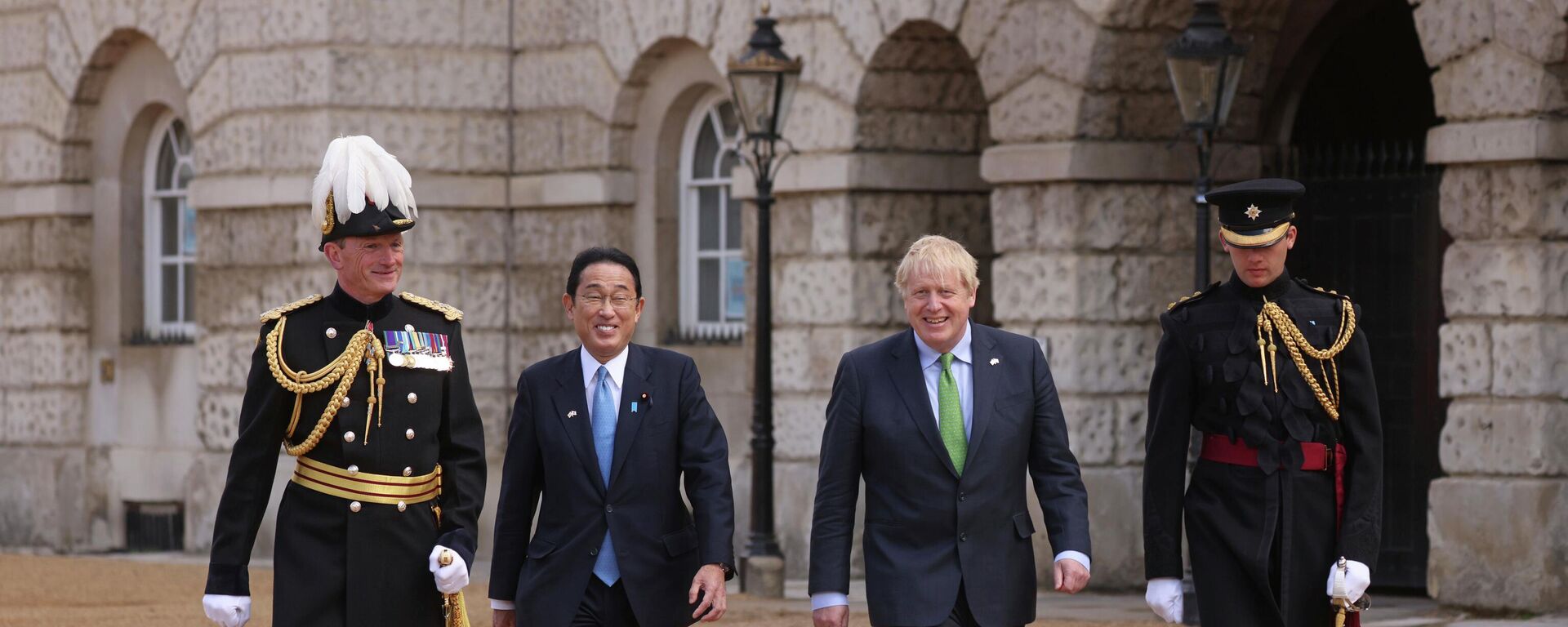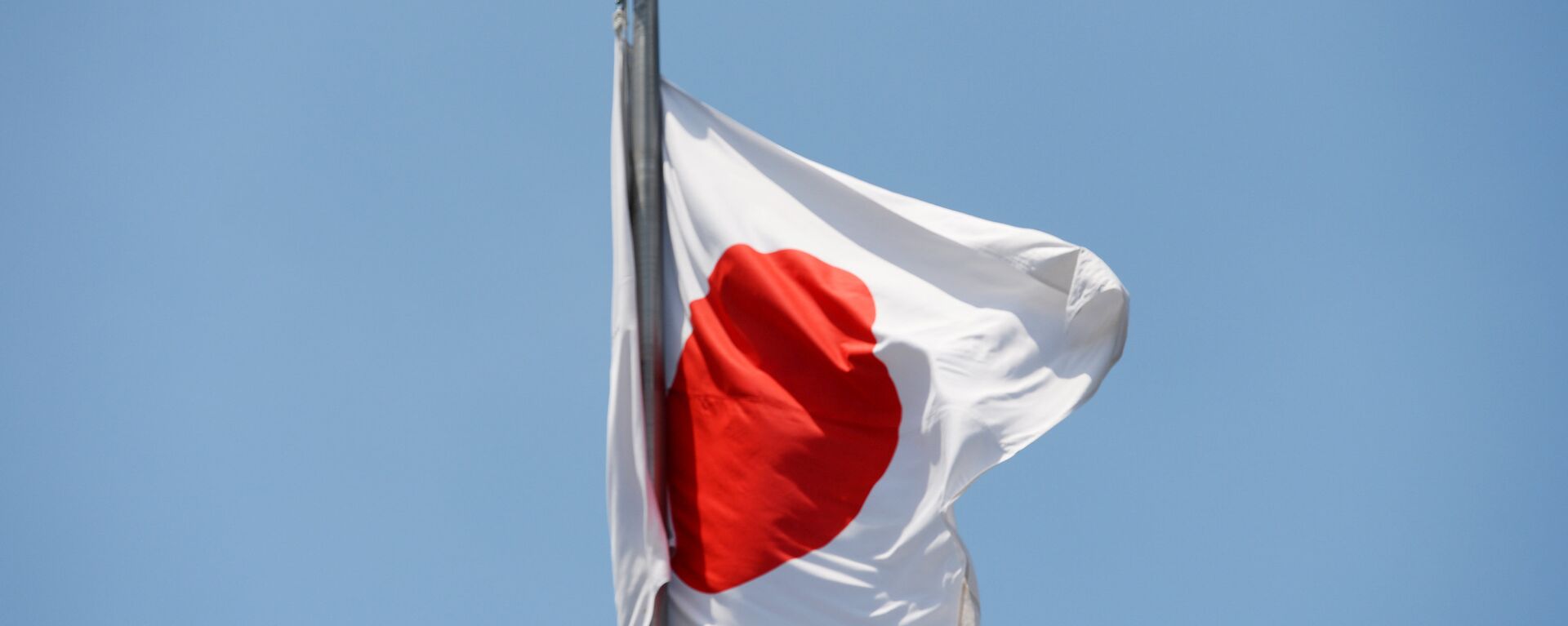https://sputnikglobe.com/20220506/beijing-blasts-kishidas-five-nation-confrontation-tour-penning-defense-deals-across-asia-europe-1095321316.html
Beijing Blasts Kishida’s Five-Nation ‘Confrontation’ Tour Penning Defense Deals Across Asia, Europe
Beijing Blasts Kishida’s Five-Nation ‘Confrontation’ Tour Penning Defense Deals Across Asia, Europe
Sputnik International
Last October, Japan finished fitting out its “helicopter destroyer” JS Izumo to carry F-35 fighters, making it an aircraft carrier in all but name. The... 06.05.2022, Sputnik International
2022-05-06T20:46+0000
2022-05-06T20:46+0000
2023-06-19T12:43+0000
japanese self defense force (jsdf)
asean
china
boris johnson
fumio kishida
aukus
japan
taiwan
https://cdn1.img.sputnikglobe.com/img/07e6/05/06/1095321970_0:160:3073:1888_1920x0_80_0_0_a18e5054f67a01375b01229ec0eed40a.jpg
Japanese Prime Minister Fumio Kishida wrapped up a five-nation tour on Thursday by visiting London, where he discussed trade and signed a new defense pact with UK Prime Minister Boris Johnson that, like many others, is obviously aimed at coordinating future military action against China.The pact is very similar to the Reciprocal Access Agreement Johnson signed with Australian Prime Minister Scott Morrison in January, which aimed at creating “streamlined arrangements to support the deployment of defense forces more quickly and with less administration,” as Morrison described it. This includes joint training, the sharing of ammunition, and other cooperation.The deal fits with other pacts aimed at “containing” China, such as AUKUS and the Quadrilateral Security Dialogue, and comes as a Japanese warship shadowed a Chinese aircraft carrier strike group drilling in the Philippine Sea earlier this week.“The Japanese side has kept slipping its own agenda in diplomatic activities, played up regional tensions by making an issue out of China and hyped up the so-called China threat,” Chinese Foreign Ministry spokesperson Zhao Lijian told reporters on Friday.Taiwan, Ukraine ‘Cannot Be Mentioned in the Same Breath’Zhao also responded to Kishida’s claim in London that “Ukraine may be tomorrow’s East Asia,” an oft-made comparison between Russia’s troubled relationship with Ukraine and China’s ongoing dispute with the government on Taiwan.The spokesperson recalled Japan’s “grave historical responsibilities” on the Taiwan issue, which Tokyo seized from China in 1895 and ruled as a colony for 50 years, only renouncing its sovereignty over the island in 1952.The government in Taiwan is all that remains of the Republic of China that ruled all of China prior to the communist victory in the civil war in 1949, when the People’s Republic of China was established in Beijing. Since then, all but a handful of nations have switched their recognition of the Chinese government from Taipei to Beijing, but several pro-US nations have continued to informally but openly back the Taiwanese government by giving it weapons and political cover on the international stage.Liu Jiangyong, an expert on regional affairs at Tsinghua University in Beijing, told the South China Morning Post that the tour proves Kishida is not the dove he was thought to be and that Japan is pursuing its own interests in the region.Article 9 of the Japanese Constitution compels the island nation to “forever renounce war as a sovereign right of the nation,” with its self-defense force becoming an accepted fact in Japanese politics despite not being explicitly authorized by Article 9. However, the clause has come under increasing attack in Japanese politics in recent years, with Kishida’s predecessor, Shinzo Abe, failing to revoke or revise it, and Tokyo’s defense budget ballooning dramatically.‘Trip for Peace’ Replete With Military DealsKishida’s London stop was only the final leg of a five-nation tour that began last week. The Japanese prime minister touted it as a “trip for peace,” but in Indonesia and Thailand, he penned defense agreements and weapons transfers aimed at realizing a "free and open Indo-Pacific” - a Pentagon shorthand term for suppressing China’s continued rise.The fury in Canberra and Washington over a defense deal between China and the Solomon Islands is emblematic of this fear, with the US threatening military action in response to a hypothetical future Chinese base being built there and Australian Defence Minister Peter Dutton claiming China could launch a chemical weapons attack on Australia from the archipelago.The US and Australia have long hoped to fan anti-Chinese fears in the Association of Southeast Asian Nations (ASEAN) member states in an effort to compel them to accept their military leadership as the only solution to ongoing disputes over several island chains in the South China Sea. China, Taiwan, Vietnam, and several other nations have made overlapping claims to many of the islands, fortifying them and chasing off rival claimants’ fishing and military vessels.Kishida also visited Vietnam, where he talked about economic and security ties with Prime Minister Pham Minh Chinh, including a commitment, similar to that made with Johnson over Taiwan, to “strongly oppose attempts to change the status quo in the South China Sea,” as Japan’s Kyodo News Agency put it. He also stopped in Italy to discuss trade, travel, and the abolition of nuclear weapons.
https://sputnikglobe.com/20220506/japan-uk-sign-anti-china-defense-pact-as-tokyo-adopts-anti-russia-sanctions-1095318952.html
https://sputnikglobe.com/20220502/japan-remains-divided-on-amending-war-renouncing-constitution-poll-reveals-1095199249.html
china
japan
taiwan
Sputnik International
feedback@sputniknews.com
+74956456601
MIA „Rosiya Segodnya“
2022
Sputnik International
feedback@sputniknews.com
+74956456601
MIA „Rosiya Segodnya“
News
en_EN
Sputnik International
feedback@sputniknews.com
+74956456601
MIA „Rosiya Segodnya“
Sputnik International
feedback@sputniknews.com
+74956456601
MIA „Rosiya Segodnya“
japanese self defense force (jsdf), asean, china, boris johnson, fumio kishida, aukus, japan, taiwan
japanese self defense force (jsdf), asean, china, boris johnson, fumio kishida, aukus, japan, taiwan
Beijing Blasts Kishida’s Five-Nation ‘Confrontation’ Tour Penning Defense Deals Across Asia, Europe
20:46 GMT 06.05.2022 (Updated: 12:43 GMT 19.06.2023) Last October, Japan finished fitting out its “helicopter destroyer” JS Izumo to carry F-35 fighters, making it an aircraft carrier in all but name. The situation is just one example of how Tokyo has pushed the limits of its constitutional neutrality to reassert military and political power in East Asia and beyond.
Japanese Prime Minister Fumio Kishida wrapped up a five-nation tour on Thursday by visiting London, where he discussed trade and
signed a new defense pact with UK Prime Minister Boris Johnson that, like many others, is obviously aimed at coordinating future military action against China.
The pact is very similar to the Reciprocal Access Agreement Johnson signed with Australian Prime Minister Scott Morrison in January, which aimed at creating “streamlined arrangements to support the deployment of defense forces more quickly and with less administration,”
as Morrison described it. This includes joint training, the sharing of ammunition, and other cooperation.
The deal fits with other pacts aimed at “containing” China, such as AUKUS and the Quadrilateral Security Dialogue, and comes as a Japanese warship shadowed a Chinese aircraft carrier strike group drilling in the Philippine Sea earlier this week.
“The Japanese side has kept slipping its own agenda in diplomatic activities, played up regional tensions by making an issue out of China and hyped up the so-called China threat,” Chinese Foreign Ministry spokesperson
Zhao Lijian told reporters on Friday.
“By doing so, Japan aims to find excuses for beefing up its military capabilities and undermine mutual trust and cooperation among regional countries. This is not conducive to regional peace and stability and will win no support.”
Taiwan, Ukraine ‘Cannot Be Mentioned in the Same Breath’
Zhao also responded to Kishida’s claim in London that “Ukraine may be tomorrow’s East Asia,”
an oft-made comparison between Russia’s troubled relationship with Ukraine and China’s ongoing dispute with the government on Taiwan.
“Taiwan is an inalienable part of Chinese territory. The Taiwan question is purely China’s internal affairs, which cannot be mentioned in the same breath with the Ukraine situation,” Zhao reiterated.
The spokesperson recalled Japan’s “grave historical responsibilities” on the Taiwan issue, which Tokyo seized from China in 1895 and ruled as a colony for 50 years, only renouncing its sovereignty over the island in 1952.
The government in Taiwan is all that remains of the Republic of China that ruled all of China prior to the communist victory in the civil war in 1949, when the People’s Republic of China was established in Beijing. Since then, all but a handful of nations have switched their recognition of the Chinese government from Taipei to Beijing, but several pro-US nations have continued to informally but openly back the Taiwanese government by giving it weapons and political cover on the international stage.
Liu Jiangyong, an expert on regional affairs at Tsinghua University in Beijing, told the
South China Morning Post that the tour proves Kishida is not the dove he was thought to be and that Japan is pursuing its own interests in the region.
“It has become clear that our expectations were misplaced. Japan is not just following the US in countering China, it is actually trying to exploit the differences between Beijing and Washington to boost its own geopolitical influence and seek military build-up,” Liu said.
Article 9 of the Japanese Constitution compels the island nation to “forever renounce war as a sovereign right of the nation,” with its self-defense force becoming an accepted fact in Japanese politics despite not being explicitly authorized by Article 9. However, the clause has come under increasing attack in Japanese politics in recent years, with Kishida’s predecessor,
Shinzo Abe, failing to revoke or revise it, and
Tokyo’s defense budget ballooning dramatically.
‘Trip for Peace’ Replete With Military Deals
Kishida’s London stop was only the final leg of a five-nation tour that began last week. The Japanese prime minister touted it as a “trip for peace,” but in
Indonesia and Thailand, he
penned defense agreements and weapons transfers aimed at realizing a "free and open Indo-Pacific” - a Pentagon shorthand term for suppressing China’s continued rise.
The fury in Canberra and Washington over a defense deal between China and the Solomon Islands is emblematic of this fear, with the US threatening military action in response to a hypothetical future Chinese base being built there and Australian Defence Minister Peter Dutton claiming China could launch a chemical weapons attack on Australia from the archipelago. The US and Australia have long hoped to fan anti-Chinese fears in the Association of Southeast Asian Nations (ASEAN) member states in an
effort to compel them to accept their military leadership as the only solution to ongoing disputes over several island chains in the South China Sea. China, Taiwan, Vietnam, and several other nations have made overlapping claims to many of the islands,
fortifying them and chasing off rival claimants’ fishing and military vessels.
Kishida also visited Vietnam, where he talked about economic and security ties with Prime Minister Pham Minh Chinh, including a commitment, similar to that made with Johnson over Taiwan, to “strongly oppose attempts to change the status quo in the South China Sea,” as Japan’s Kyodo News Agency put it. He also stopped in Italy to discuss trade, travel, and the abolition of nuclear weapons. 




